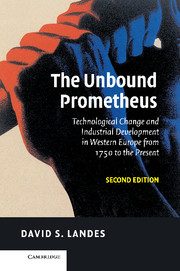 The Unbound Prometheus
The Unbound Prometheus 5 - Short breath and second wind
Published online by Cambridge University Press: 05 June 2014
Summary
The years from 1873 to 1896 seemed to many contemporaries a startling departure from historical experience. Prices fell unevenly, sporadically, but inexorably through crisis and boom—an average of about one-third on all commodities. It was the most drastic deflation in the memory of man. The rate of interest fell too, to the point where economic theorists began to conjure with the possibility of capital so abundant as to be a free good. And profits shrank, while what were now recognized as periodic depressions seemed to drag on interminably. The economic system appeared to be running down.
Then the wheel turned. In the last years of the century, prices began to rise and profits with them. As business improved, confidence returned—not the spotty, evanescent confidence of the brief booms that had punctuated the gloom of the preceding decades, but a general euphoria such as had not prevailed since the Gründerjahre of the early 1870's. Everything seemed right again—in spite of rattlings of arms and monitory Marxist references to the ‘last stage’ of capitalism. In all of western Europe, these years live on in memory as the good old days—the Edwardian era, la belle époque.
Their memory is brightened by the contrast with the years of death and disenchantment that followed. In every field, the war seems to be the great divide: between optimism and pessimism, parliamentary democracy and fascism, progress and decline.
- Type
- Chapter
- Information
- The Unbound PrometheusTechnological Change and Industrial Development in Western Europe from 1750 to the Present, pp. 231 - 358Publisher: Cambridge University PressPrint publication year: 2003


